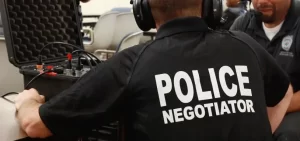
You might be wondering, for good reason, what the FBI has to do with sales. Enter the world of hostage negotiation.
If you’re unfamiliar with the situation, let me set it up in one sentence. A bad guy with a weapon has an innocent person in their custody, which means cops can’t go in without possibly injuring this innocent person. That’s where hostage negotiators come in. They bring a special arsenal of language tricks that can make some of the most hostile people in the world willingly give themselves into police custody. In fact, 95% of police negotiations end without deaths on either side. If a speech tactic good enough for a life-or-death situation, it’s probably good enough for us humble salespeople. Here are some tips from the book “Never split the difference” by Chris Voss (If you like what you read, I’d highly recommend you purchase it.)
1: Try to get your client to avoid brushing you off with “easy words”. We’ve all done it. We want someone to stop talking so we shout them down with, “I get it, I get it” or, “Yeah, yeah, yeah”. 9/10 out of 10 your client doesn’t get it, they just want to leave the conversation. Instead, use open ended questions that force your client to think more deeply.
2: Just ask! A common tactic of criminals is to lie that they have hostages. Police found out that you could tell who really had hostages simply by asking them to show the hostage. In the same way if you want to know something, just ask your client.
3: Use your voice. Your voice is often your most effective weapon in negotiation. An angry voice will make the crooks double down. A calm officer, on the other hand, makes crooks realize they can have a reasonable conversation with the guy on the other end of the phone.
4: Don’t think about only money. Only negotiating for money, even if you get a good deal, still leaves a lot on the table. if you’re selling to an advertising agency, think about asking for a free advertising campaign in turn. Even the founder of Lego originally traded his toys to stores in exchange for groceries, if they didn’t have the money to pay him flat.
5: Look for a black swan. This is a weakness somebody tries to hide, usually relating to their motives. Think about car dealers, who get paid their bonuses at the end of each quarter. If you wait until the end of the financial quarter, you can often get a better deal on cars because dealers are desperate to sell.
Now that you know these tips, see if you can see them in one of Voss’s stories.
It’s the 1970’s, and a gang in South America has kidnaped an American tourist, demanding $100,000 for his release. Voss got on the phone with the gang’s leader. He calmly talked to him, asking him what they wanted the money for. He learned that they took the money they got from kidnapping to party all weekend long. So instead of taking any of the deals the terrorists offered, Voss dragged out the negotiation until Friday. The anxious gangsters, not wanting to miss the party, asked for $1,500. Voss countered with $1,000 and a VCR. The terrorists took the deal.
Were you able to see what Voss did? If so, what techniques do you think you can apply to your sales methods?
I really never would have thought about the buying and selling process applying to something like the FBI. I really like how you went into detail about the different processes that the FBI goes through and how it applies to something we’re learning in class. It goes to show that non-sales selling really is everywhere
What a fascinating read! Very well done. I loved the parallels you drew between hostage negotiation and sales tactics. The black swan could be another way to find the true pain of a client. I see a connection between both parties being likely to lie, so I love the points you made to address both. Your example of asking questions is a great illustration of what we have been learning in class.
Exploring Chris Voss’s hostage negotiation techniques opened my eyes to new sales strategies. His focus on using one’s voice and asking open-ended questions has transformed how I engage with clients, making interactions more meaningful. Uncovering hidden motives, or the ‘black swan,’ has been particularly insightful, allowing me to tailor my offers more effectively. Voss’s story of negotiation for a hostage’s release with creativity and empathy inspired me to apply similar tactics in sales, emphasizing the importance of understanding and leveraging human psychology for better outcomes.